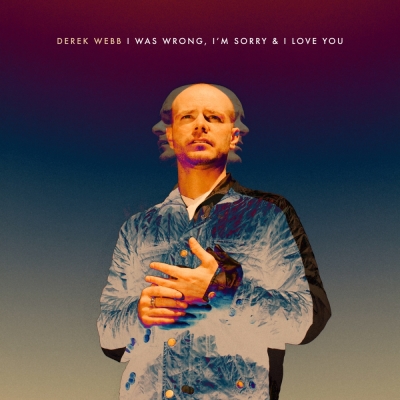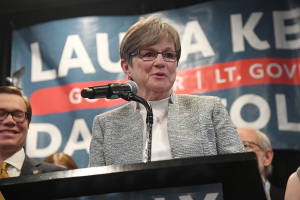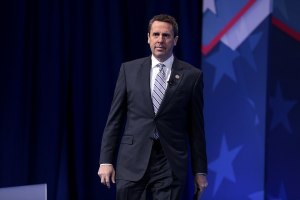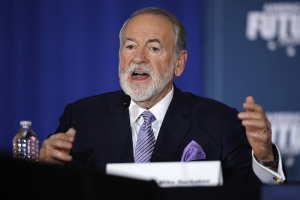Derek Webb Says the Stigma of 'Christian Music' is Not Helpful for Evangelization (INTERVIEW PART 2)
The Caedmon's Call ex-frontman talks about the stigma that comes with the term "Christian Music."

Derek Webb, former singer of Caedmon's Call and President of NoiseTrade music sharing website, discussed his new album, I Was Wrong, I'm Sorry & I Love You, what it's like being a 20 year veteran in music, and why the label of "Christian artist" is not always the best thing for getting the gospel heard.
Read part one of the interview here.
Christian Post: Do you feel music is a gateway to evangelism, and why do you think people are more receptive to music?
Derek Webb: I don't really feel like music is a gateway to evangelism. I certainly don't use it that way. There are some people who feel called to be professional vocational ministers, that their job is ministry, I don't personally feel that way. When I go and I play shows, make records, write songs, I don't consider that vocational ministry for me. I'm a singer/songwriter. I'm an artist. My job description and the basis upon which I make choices about how to do my job is hoping to make excellent art and to write and perform songs with excellence.
Now in any job there are going to be opportunities where ministry can happen and you want to be ready and aware of those moments. My brother, for instance, is a family practice doctor in Lincoln, Nebraska. He's also a Christian, as am I. He's not a vocational Christian minister; he is a professional doctor. He doesn't go to work everyday to evangelize, he goes to work everyday to provide excellent healthcare. It's very much the same for me. I don't do that in order to evangelize, I do it to make excellent art that's engaging that people resonate with.
I do acknowledge that music is really powerful and I've seen that. But I think that art is not at its best use when it's being used as a tool to do something else. The entire first chapter of the Bible is our marveling at God for making all things out of nothing. In the beginning God created. It's the first attribute we learn of His in the Bible; He's creative. There is intrinsic value in creativity and making things that are excellent and that's more how I approach my job.
CP: Do you think putting the label Christian over an artist hinders what they can do musically, and also alienates them from a group of people who might genuinely enjoy the music?
DW: I've always felt, even back to the first earliest days of Caedmon, that the term 'Christian' has never been helpful, in my opinion. Caedmon got its start playing at a lot of colleges. If the promoters put "Christian band" on the flyer, then half the amount of people would show up just because they weren't interested; not because they had heard us, not because they had any idea of what we were going to say or how it was going to go down. They just weren't interested and I probably wouldn't have been either.
I feel like even if you're intention is to evangelize and do ministry, it's smarter to not put a category on something before people even have a chance to hear it or experience it. That might alienate them and keep them from even wanting to give it a try in the first place, especially if they might really love it. If you have no idea what people think of that word, why would you use it? Especially when, in my opinion, the term Christian when applied to anything other than a human being is a marketing term.
CP: Between Caedmon's Call and your solo career, what was your defining moment as an artist that made you say, "Wow, I did it."
DW: I don't know. I feel like it's probably a thousand seemingly insignificant moments along the way. I remember Caedmon spent three or four years independent. We put out a couple records and were touring nationally before we found our first record deal. When Caedmon signed our first deal, as a songwriter, for me, I was poor as poor gets. When I started to make money, I had to go open a bank account and I realized that I was going to be able to support myself, that this is actually a job that I could do. Now that was a big moment.
I remember several moments along the way where it was dawning on me that I was going to be able to do this for the rest of my life. Nowadays, the dream is just different. The dream now is to make a sustainable wage being blue-collar, learning how to find your tribe and make art that resonates with them. If your ego can bear not being a household name or ever making seven figures in a year, you can have a great job as an independent artist. But if what you're looking for is fame and fortune, you should probably get into another line of work.
CP: Aside from the new album, what's on the horizon for you?
DW: I'm going to spend some real time promoting the record. I'm going to get out on the road before the end of the year. I also am the President of Noisetrade and run that company, so that's about three days a week for me and part of my every day work that I do. I have two small kids and a wife. So that sounds like three or four full-time jobs right there.
I Was Wrong, I'm Sorry & I Love You will be released September 3. Webb wrote, recorded, and produced every song on the album.
Website





























